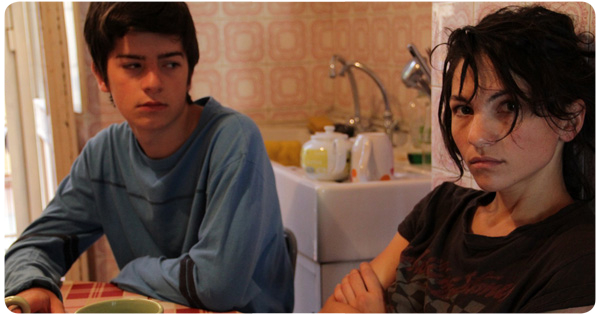 LUIGI CIARDO AND MANUELA MARTELLI IN IL FUTUROOrphans in Rome
LUIGI CIARDO AND MANUELA MARTELLI IN IL FUTUROOrphans in RomeFor her third feature Chilean writer-director Alicia Scherson -- whose Santiago-set debut,
Play, (SFIFF 2006) I loved -- has adapted a final hitherto untranslated novella,
Una novelita lumpen, by the noted Chilean writer Roberto Bolaño (1953-2003). (Bolaño's National Book Critics Circle Award-winning Pynchon-like
2666 is his best known work in the US.) Viewing
Il Futuro at Sundance,
Variety's Alissa Simon
called it a "moody head scratcher," and the story's trajectory indeed makes it wind up feeling atmospheric but curiously inconsequential; one wants to say "So what?" In a nutshell, Bianca (Manuela Martelli) and her younger brother Tomaso (Luigi Ciardo) become orphans in Rome when their parents are killed in a car accident, and falling heir to their father's pension they're allowed by home services, on approval, to live on by themselves in their parents' nice suburban apartment. They both see a strange bright light, made visible to them, according to Tomaso, by "paranormal" energy released by the accident -- one of several novelistic ideas fed to us too fast to make sense of. Hanging out in a gym now instead of gong to school, Tomaso brings two dubious young body builders/"personal trainers" to the house and they not only move in, but sleep with Bianca, and then persuade her to begin sleeping with a decrepit and now blind ex-Mr. Universe and former star of Italian Hercules or Maciste movies (Rutger Hauer), to find a stash of money they think the paranoid, reclusive "Maciste" has stored in a strong box at his big dark house.
Il Futuro begins with handsome film noir or Sixties Italian B-picture opening credits, and the tech aspects are all fine. The film's betrayal of conventional expectations fits Scherson's genius as exhibited in
Play, and its lack of point seems intentional: it's all meant to be seen as a youthful episode: what counts is not
this but the future, "il futuro." At the end Bianca and Tomaso have said goodbye to Maciste and the sleazy gym rats and are ready to move on, though they still have a feeling of apprehension about something ominous in the air. If the Rome of
Il Futuro, which is in Italian and English and appears to follow Bolaño's novel rather faithfully, hasn't the intimate and personal feel of the filmmaker's Santiago in
Play, it again has vivid, clearly realized scenes (or memorably murky ones in the house of the blind old actor) and a sense of place, and the people also are distinctive and present. But while Scherson's new film comes closer to conventional narrative then her two earlier ones, it's only close enough to leave one frustrated.
Play took place in bright sunlight.
Il Futuro is dominated by the oppressive "afa" of a Roman summer, and subtly ominous throbbing music (by Caroline Chaspoul and Eduardo Henriquez) dominates the scenes, especially the ones in the dim interiors of Maciste's house, where the photography mimics his blindness by making it hard for the viewer to discern spaces clearly. There is a certain humor in the scenes at home with the sub-mental harmlessly thuggish body builders Libio (Nicolas Vaporidis) and Boloñes (Alessandro Giallocosta), "blood brothers" who are very domestic, straighten up, do the dishes, and serve proper cooked meals like lasagna or spaghetti and meatballs, but otherwise live like slobs. While Bianca is always going out for her dark sessions with Maciste (who thinks he is rotting inside and his sperm is turning black) or to work at the hairdresser's where she's taken a servile job, Tomaso watches porn pirated off the cable TV system, hoping to train for when he loses his virginity. There is constant snacking, making of sandwiches by Maciste, and everyone is always popping open canned soft drinks.
Tomaso's and Bianca's giving up going to school and getting involved in these inconsequential digressions, parallel to the "fugures" in
Play, seems to be a sign that the sudden loss of their parents has left them rudderless and rebellious. For a while Tomaso follows Libio and Boloñes around like a puppy, but he doesn't seem in their thrall. Bianca, whose voiceovers punctuate the film, thinks for a while she's in love with Maciste (Rutger Hauer, speaking only English, seeming alternately sad, menacing, or strange). But she decides the search for the strong box is stupid and she's not interested in Maciste any more either, and she commands the body builders to move out while she and Tomaso go for a walk in the Roman hills and eat ice cream cones. And that's the end of it. Maybe you would get it better if you'd read Bolaño's novella.
Il Futuro isn't satisfying, but I'll still think Scherson is a smart, distinctive filmmaker.
Il Futuro debuted at Sundance, and a week later at Rotterdam. Theatrical releases are set for Italy 6 June and Germany 12 September 2013. It was screened for this review as part of the SFIFF (showing May 7-8-9, 2013 ).





